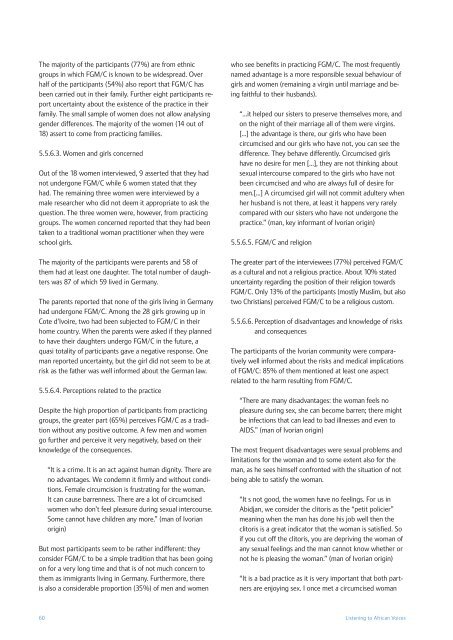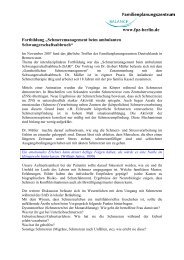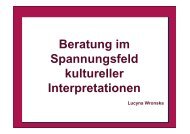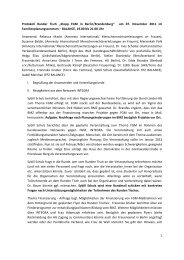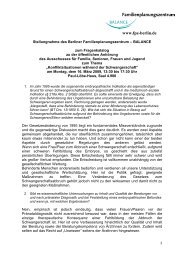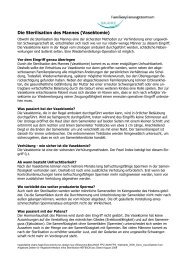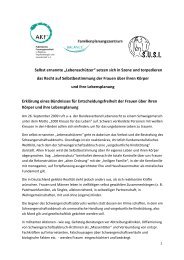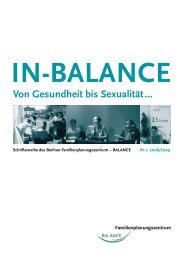Listening to African Voices - FPZ
Listening to African Voices - FPZ
Listening to African Voices - FPZ
Create successful ePaper yourself
Turn your PDF publications into a flip-book with our unique Google optimized e-Paper software.
The majority of the participants (77%) are from ethnicgroups in which FGM/C is known <strong>to</strong> be widespread. Overhalf of the participants (54%) also report that FGM/C hasbeen carried out in their family. Further eight participants reportuncertainty about the existence of the practice in theirfamily. The small sample of women does not allow analysinggender differences. The majority of the women (14 out of18) assert <strong>to</strong> come from practicing families.5.5.6.3. Women and girls concernedOut of the 18 women interviewed, 9 asserted that they hadnot undergone FGM/C while 6 women stated that theyhad. The remaining three women were interviewed by amale researcher who did not deem it appropriate <strong>to</strong> ask thequestion. The three women were, however, from practicinggroups. The women concerned reported that they had beentaken <strong>to</strong> a traditional woman practitioner when they wereschool girls.The majority of the participants were parents and 58 ofthem had at least one daughter. The <strong>to</strong>tal number of daughterswas 87 of which 59 lived in Germany.The parents reported that none of the girls living in Germanyhad undergone FGM/C. Among the 28 girls growing up inCote d’Ivoire, two had been subjected <strong>to</strong> FGM/C in theirhome country. When the parents were asked if they planned<strong>to</strong> have their daughters undergo FGM/C in the future, aquasi <strong>to</strong>tality of participants gave a negative response. Oneman reported uncertainty, but the girl did not seem <strong>to</strong> be atrisk as the father was well informed about the German law.5.5.6.4. Perceptions related <strong>to</strong> the practiceDespite the high proportion of participants from practicinggroups, the greater part (65%) perceives FGM/C as a traditionwithout any positive outcome. A few men and womengo further and perceive it very negatively, based on theirknowledge of the consequences.“It is a crime. It is an act against human dignity. There areno advantages. We condemn it firmly and without conditions.Female circumcision is frustrating for the woman.It can cause barrenness. There are a lot of circumcisedwomen who don’t feel pleasure during sexual intercourse.Some cannot have children any more.” (man of Ivorianorigin)But most participants seem <strong>to</strong> be rather indifferent: theyconsider FGM/C <strong>to</strong> be a simple tradition that has been goingon for a very long time and that is of not much concern <strong>to</strong>them as immigrants living in Germany. Furthermore, thereis also a considerable proportion (35%) of men and womenwho see benefits in practicing FGM/C. The most frequentlynamed advantage is a more responsible sexual behaviour ofgirls and women (remaining a virgin until marriage and beingfaithful <strong>to</strong> their husbands).“…it helped our sisters <strong>to</strong> preserve themselves more, andon the night of their marriage all of them were virgins.[...] the advantage is there, our girls who have beencircumcised and our girls who have not, you can see thedifference. They behave differently. Circumcised girlshave no desire for men […], they are not thinking aboutsexual intercourse compared <strong>to</strong> the girls who have notbeen circumcised and who are always full of desire formen.[…] A circumcised girl will not commit adultery whenher husband is not there, at least it happens very rarelycompared with our sisters who have not undergone thepractice.” (man, key informant of Ivorian origin)5.5.6.5. FGM/C and religionThe greater part of the interviewees (77%) perceived FGM/Cas a cultural and not a religious practice. About 10% stateduncertainty regarding the position of their religion <strong>to</strong>wardsFGM/C. Only 13% of the participants (mostly Muslim, but alsotwo Christians) perceived FGM/C <strong>to</strong> be a religious cus<strong>to</strong>m.5.5.6.6. Perception of disadvantages and knowledge of risksand consequencesThe participants of the Ivorian community were comparativelywell informed about the risks and medical implicationsof FGM/C: 85% of them mentioned at least one aspectrelated <strong>to</strong> the harm resulting from FGM/C.“There are many disadvantages: the woman feels nopleasure during sex, she can become barren; there mightbe infections that can lead <strong>to</strong> bad illnesses and even <strong>to</strong>AIDS.” (man of Ivorian origin)The most frequent disadvantages were sexual problems andlimitations for the woman and <strong>to</strong> some extent also for theman, as he sees himself confronted with the situation of notbeing able <strong>to</strong> satisfy the woman.“It s not good, the women have no feelings. For us inAbidjan, we consider the cli<strong>to</strong>ris as the “petit policier”meaning when the man has done his job well then thecli<strong>to</strong>ris is a great indica<strong>to</strong>r that the woman is satisfied. Soif you cut off the cli<strong>to</strong>ris, you are depriving the woman ofany sexual feelings and the man cannot know whether ornot he is pleasing the woman.” (man of Ivorian origin)“It is a bad practice as it is very important that both partnersare enjoying sex. I once met a circumcised woman60<strong>Listening</strong> <strong>to</strong> <strong>African</strong> <strong>Voices</strong>


